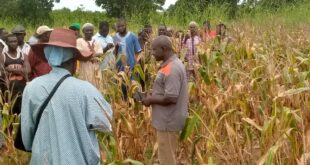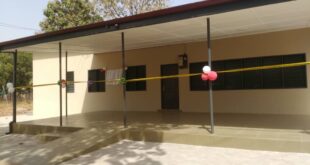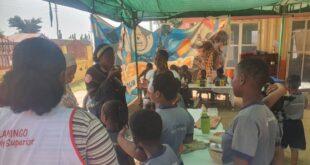
Tamale, Ghana – Available statistics suggest that women account for 70% of production of subsistence crops and form about 90% of the labour force in the marketing of farm produce in Ghana.
In Northern Ghana, women are engaged in the planting, weeding, harvesting and post-harvesting stages of all types of crops farming by assisting their parents, brothers, husbands and other community members in their farms.
But ironically, very few women own land and can use it as collateral to secure loan from a financial institution or farm on it in order to eke a living. Even some of those women who claim to own land do not have any deeds or land title registration on it.
About 80% of Ghana’s arable lands are in the hands of customary authorities such as chiefs, clans or family heads or individuals most of whom are men.
As a result the sad situation in which majority of women in the North find themselves have further worsened their socio-economic situation.
 Addressing a news conference in Tamale on Wednesday, Executive Director of Grassroots Sisterhood Foundation (GSF), Fati Alhassan, said Ghana’s current customary land administration relegates women to the background.
Addressing a news conference in Tamale on Wednesday, Executive Director of Grassroots Sisterhood Foundation (GSF), Fati Alhassan, said Ghana’s current customary land administration relegates women to the background.
“Women and the vulnerable indeed face discrimination under formal and informal customary system of land tenure. The current system ignores their holding rights to land. This scenario excludes women from having control over land in spite of enacted legislation such as the 1992 Constitution of Ghana, the African Charter and other international conventions which provides for equal non-discriminatory rights to all citizens of resources and opportunities.
“Aside from the social construct that relegates women to being part of a man’s property in most parts of the Northern Region, the socio-cultural policies and practices in land tenure security further aggravates the issues for women as it gives greater control and allodial rights only to male members of the family or communities thereby increasing women’s dependency and vulnerability”, she observed.
Madam Fati also pointed out that, women are largely excluded from land administration and governance in Ghana, and in Dagbon, “the youth and women are excluded from land related discussion”.
According to her, women are only recipients of final results from any discussions around land management and administration but stressed that, the livelihoods of women and the most vulnerable are closely tied with land for agricultural purposes.
 “All positions of leadership from the chief to the court jester are occupied by men, and since these positions are inherited only by male descendants of the royal families women do not stand any chance to occupying these positions at the community level or in the traditional area. There is only one position led by a woman and that is the community women’s leader otherwise called the Magazia. Decisions are therefore taken by men at the chiefs meeting halls and women leaders are exempt from these spaces”, she stated.
“All positions of leadership from the chief to the court jester are occupied by men, and since these positions are inherited only by male descendants of the royal families women do not stand any chance to occupying these positions at the community level or in the traditional area. There is only one position led by a woman and that is the community women’s leader otherwise called the Magazia. Decisions are therefore taken by men at the chiefs meeting halls and women leaders are exempt from these spaces”, she stated.
Madam Fati implored chiefs and land owners in the Northern Region to allocate lands to women who need them for agricultural purposes on long term basis so as to enable the women recoup any investment they would have made in the lands.
“I call on chiefs to modify culture and eliminate negative practices that are detrimental to the progress of women and the girl child as well as embark on reforms at community level through to the national level and work towards allowing the land laws to protect women’s access and secure land tenure to ensure food and income securities”, she opined

She also urged parliament to endeavor to pass the land bill which has been in the House for many years. “I demand that Members of Parliament engage with their constituents to understand the issues confronting women and the youth particularly the rural women farmers, collate their views on the current land bill and consequently look at and pass the bill with gender considerations as presented by gender activists and well-meaning members of the society”.
The Executive Director of GSF, said her organisation and partners would also develop a land tenure agreement which would enable land owners and women looking for land to farm to enter into an agreement in order to guarantee security of tenure for the women so that they can derive enough benefit from their investments.

Grassroots Sisterhood Foundation is a women-led organization in Tamale working to enhance power relation in poor communities of Northern Ghana. Over a decade, GSF has strived to ensure the voices of women are heard in various spaces be it on human rights, economic or social justice. In the process we have established various platforms including the Women Advocacy Platform (WAP) comprising women chiefs and community women leaders to address issues of concern in their communities; the Community Practitioners Platform to among others address issues of climate change. The Home-based Care Alliance was also created to demand recognition and compensation for women’s contributions to care giving particularly to persons living with HIV/AIDS and the Aged.
By Savannahnewsonline.com/Philip Liebs
 Savannah News Online Reporting Only What Matters Most
Savannah News Online Reporting Only What Matters Most



